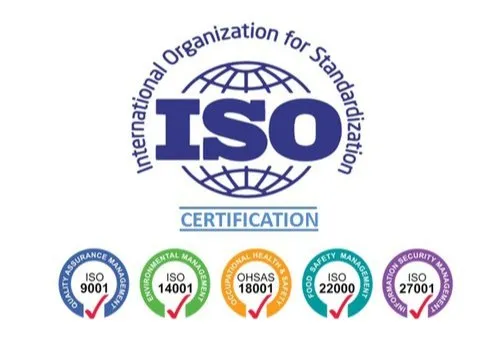Gupta Pawan and Co specializes in ISO certificate registration, helping businesses achieve recognized standards of quality, safety, and efficiency. Our expert team guides organizations through the certification process, ensuring compliance with ISO standards that enhance operational excellence and customer trust. With tailored solutions and comprehensive support, we empower companies to streamline their processes and improve their market competitiveness. Partner with us to elevate your business to global standards with confidence.
Get in touch

ISO Certificate Registration
ISO Certificate Registration is the process through which organizations demonstrate their compliance with international standards set by the International Organization for Standardization (ISO). This certification is crucial for businesses aiming to enhance quality management, improve operational efficiency, and increase customer satisfaction.
The registration process typically involves a thorough assessment of the organization’s systems and processes by a certified body. Upon successful evaluation, the organization receives an ISO certificate, which serves as a testament to its commitment to maintaining high standards. Achieving ISO certification can open doors to new markets, enhance credibility, and foster continuous improvement within the organization.
ISO Certificate Registration Process
Preparation and Planning
- Understand the Standards: Familiarize yourself with the specific ISO standard relevant to your industry (e.g., ISO 9001 for quality management).
- Gap Analysis: Assess current processes against ISO requirements to identify areas for improvement.
Training and Awareness
- Staff Training: Educate employees on ISO standards and their importance.
- Document Procedures: Develop or update necessary documentation, including policies, procedures, and records.
Implementation
- Process Improvement: Implement changes to meet ISO standards.
- Internal Audit: Conduct an internal audit to evaluate compliance and effectiveness of the implemented system.
Management Review
- Review Results: Senior management reviews audit findings and ensures that corrective actions are taken.
Select a Certification Body
- Research and Choose: Select an accredited certification body that specializes in your industry.
- Submit Application: Complete and submit the application for certification.
Certification Audit
- Stage 1 Audit: The certification body conducts a preliminary review of your documentation and readiness.
- Stage 2 Audit: A thorough evaluation of your processes and practices against the ISO standard.
Certification Decision
- If compliant, the certification body issues an ISO certificate.
- If non-compliant, corrective actions must be addressed before certification.
Surveillance Audits
- Periodic audits are conducted (usually annually) to ensure ongoing compliance and continuous improvement.
Renewal
- ISO certification typically lasts for three years, after which a re-certification audit is required.
By following these steps, organizations can achieve ISO certification, demonstrating their commitment to quality and continuous improvement.

ISO Certificate Registration Benefits
ISO certification offers numerous benefits for organizations, including:
Enhanced Credibility: Being ISO certified demonstrates commitment to quality and standards, building trust with customers and stakeholders.
Improved Efficiency: The processes outlined in ISO standards help organizations streamline operations, reduce waste, and increase productivity.
Customer Satisfaction: Consistent quality in products and services can lead to higher customer satisfaction and loyalty.
Market Advantage: ISO certification can differentiate an organization from competitors, making it more attractive to potential clients.
Access to New Markets: Some markets or contracts require ISO certification, so having it can open up new business opportunities.
Risk Management: ISO standards encourage organizations to identify and mitigate risks, leading to improved safety and compliance.
Employee Engagement: Involvement in the certification process can foster a culture of continuous improvement, motivating employees and increasing job satisfaction.
Regulatory Compliance: ISO standards can help organizations ensure they meet relevant legal and regulatory requirements.
Continuous Improvement: The ISO framework promotes ongoing evaluation and improvement of processes, products, and services.
Better Supplier Relationships: Certification can enhance supplier management and collaboration, ensuring quality across the supply chain.
Conclusion
In conclusion, ISO certificate registration is a valuable investment for organizations seeking to enhance their operational efficiency, build credibility, and improve customer satisfaction. By adhering to internationally recognized standards, businesses can streamline processes, manage risks effectively, and differentiate themselves in competitive markets. The benefits extend beyond immediate operational improvements, fostering a culture of continuous improvement and innovation.
Ultimately, ISO certification not only helps organizations meet regulatory requirements but also positions them for long-term success by opening new market opportunities and strengthening stakeholder relationships. Embracing ISO standards can lead to sustainable growth and a reputation for quality and reliability in the marketplace.
Contact us today !!
